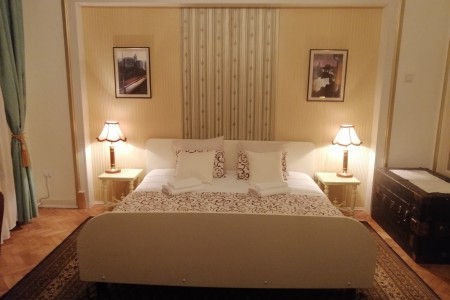| Belgrade , Francuska 21 |

Belgrade Attractions - House Nikola Pasic from the list Belgrade Attractions is in Francuska Street, and was built in 1872, it consists of a basement, ground floor and a mansard roof. The property which the house from the list Belgrade Attractions was built on belonged to the famous dealers, Nikola and Kosta Dzanga. The house is a one-family house with a garden, a high-ground floor and high ceilings.
According to data from the family archives of Nikola Pasic,he bought the house after the deaths of Nikola and Kosta, at a public auction held by the police in 1893.
After basic repairs and reconstructions of the house, Nikola Pasic moved in and lived there until his death, in 1926.
In the period between 1921 in 1922 the house was renovated and the basic layout was greatly altered. An additional floor was built on one part of the house, a segment was added onto the courtyard and the installation of floor heating and hot water were introduced. Subsequently, the facade was decorated and exterior plaster embellishments were added, columns and capitals with rates, a balistrada at the end of an the beginning of the mansarda as well as the decorations above the opening.
Today's appearance of the house is how it was designed by Nikola Pasic, since he was an engineer by profession, he projected the plan of the house in collaboration with the architect Marijan Vujovic.
The roof of this building is covered with eternit cement while the ground floor and the building were built out of stone-masonry blocks and bricks. In addition to the ground floor, the backyard fence was also built with stone-masonry blocks and bricks, which indicates that they are built simultaneously.
A marble plaque was put on the facade in 1936 by the Local Board of Yugoslav radical community in Belgrade in honor of the Serbian giant Nikola Pasic.
Besides Nikola Pašić, the house was home to numerous other famous Serbian people, like the longtime president of the council, a diplomat, the Minister of Foreign Affairs and President of the Radical Party and as such was open to foreign statesmen, diplomats and journalists.
From the aspect of cultural heritage the construction of the house began the development of the old Dorcol neighborhood.
| day | From | To |
|---|---|---|
| Monday | 24:00 | 24:00 |
| Tuesday | 24:00 | 24:00 |
| Wednesday | 24:00 | 24:00 |
| Thursday | 24:00 | 24:00 |
| Friday | 24:00 | 24:00 |
| Saturday | 24:00 | 24:00 |
| Sunday | 24:00 | 24:00 |





